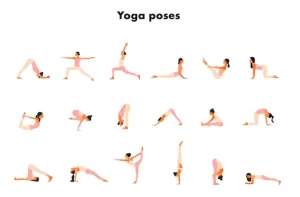Table of Contents
8 Limbs to Happiness
Yoga is practiced by old and young to be fit. It is healthy and keeps the mind and body in good shape. The person practicing remains active throughout the day.
The Yoga Sutras of Patanjali refers to 8 limbs of yoga, each of which ends to offer guidance on how to live a meaningful as well as purposeful life.
What do 8 limbs of yoga mean?
According to Patanjali’s Yoga Sutras, there is an eight-fold path that leads to liberation, known as the ‘Ashtanga Yoga System’ or ‘8 Limbs of Yoga’ (the word ‘ashta’ means ‘eight’ and ‘anga’ implies ‘limb’). But how does a person attain such freedom through yoga?
What does yoga mean?
The word ‘yoga’ means to connect, unite, or ‘yoke’. Connecting to the true Self, also known as the ‘divine essence’, ‘ultimate self’, or atman is the implication. It could be the soul too. Yoga can also mean separation or disentanglement. The ultimate goal of any yoga practice is to attain moksha, meaning liberation or freedom.
What are the 8 Limbs of Yoga?
- 1. YAMA – Restraints, moral disciplines, or moral vows
- 2. NIYAMA – Positive duties or observances
- 3. ASANA – Posture
- 4. PRANAYAMA – Breathing Techniques
- 5. PRATYAHARA – Sense withdrawal
- 6. DHARANA – Focused Concentration
- 7. DHYANA – Meditative Absorption
- 8. SAMADHI – Bliss or Enlightenment YAMA – Restraints, moral disciplines, or even moral vows
This first limb, Yama, does refer to vows, disciplines, or practices that are usually concerned with the world around us, and our interaction with it. The practice of yoga can increase physical strength and flexibility and calm the mind.
NIYAMA – Positive duties or observances
The second limb of the 8 limbs of yoga, Niyama, refers to internal duties. The prefix ‘ni’ is a Sanskrit verb that indicates ‘inward’ or ‘within’.

There are five Niyamas:
- saucha (cleanliness),
- Santosh (contentment),
- tapas (discipline or burning desire or conversely, burning of desire),
- svadhyaya (self-study or self-reflection, and study of spiritual texts), and
- isvarapranidaha (surrender to a higher power).
ASANA – Posture
The physical aspect of yoga happens to be the third step on the path to freedom. The posture should be steady and comfortable.
The idea is to be able to sit in comfort and not be ‘pulled’ by aches and pains or restlessness due to discomfort.
PRANAYAMA – Breathing Techniques
The word Prana refers to ‘energy’ or ‘life source’. Its essence keeps a person alive. Prana also often describes the breath, and by working with the way we breathe, the mind functions well.
PRATYAHARA – Sense withdrawal
Pragya means to ‘withdraw’, ‘draw in’, or ‘drawback’, and the second part Sahara indicates anything we ‘take in’ like sights, sounds, and smells.
The person is able to focus on outside things.
DHARANA – Focused Concentration
Dharana means ‘focused concentration’. Dha means ‘holding or maintaining’, and Ana means ‘other’ or ‘something else’. Dharana and pratyahara are essential parts of the same aspect. To focus on anything withdraws senses so that all attention is on that point of concentration. Tratak (candle gazing), visualization, and focusing on the breath are all practices of dharana.
DHYANA – Meditative Absorption
The seventh limb is ‘meditative absorption’. Focus is on meditation to focus and concentrate. The actual practice of meditation is not to ‘do’, but spontaneous action of something that happens as a result of everything else.
SAMADHI – Bliss or Enlightenment
Samadhi usually means ‘bliss’ or ‘enlightenment’, and is the final step of the journey of Patanjali’s Yoga Sutras. When we look at the word samadhi ‘enlightenment’ or ‘realization’ is what it implies.
‘Sama’ means ‘same’ or ‘equal’, and ‘dhi’ means ‘to see implying realization.
Conclusion
Yoga practice is good for the mind and soul.

